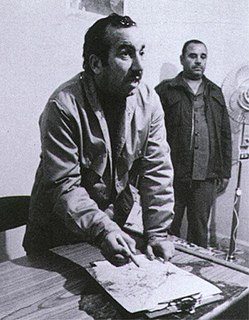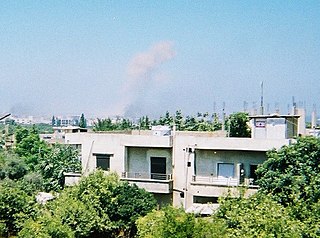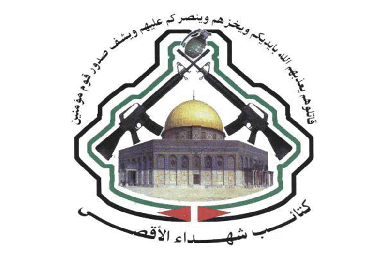Related Research Articles

Fatah, formerly the Palestinian National Liberation Movement, is a Palestinian nationalist political party and the largest faction of the confederated multi-party Palestine Liberation Organization (PLO) and the second-largest party in the Palestinian Legislative Council (PLC). The President of the Palestinian Authority is a member of Fatah.

The Palestinian National Authority is the interim self-government body established in 1994 following the Gaza–Jericho Agreement to govern the Gaza Strip and Areas A and B of the West Bank, as a consequence of the 1993 Oslo Accords. Following elections in 2006 and the subsequent Gaza conflict between the Fatah and Hamas parties, its authority had extended only in areas A and B of the West Bank. Since January 2013, the Fatah-controlled Palestinian Authority uses the name "State of Palestine" on official documents.

Sabri Khalil al-Banna, known as Abu Nidal, was the founder of Fatah: The Revolutionary Council, a militant Palestinian splinter group more commonly known as the Abu Nidal Organization (ANO). At the height of its power in the 1970s and 1980s, the ANO was widely regarded as the most ruthless of the Palestinian groups.

The Popular Resistance Committees (PRC) is a coalition of a number of armed Palestinian groups opposed to what they regard as the conciliatory approach of the Palestinian Authority and Fatah towards Israel. The PRC is especially active in the Gaza Strip, through its military wing, the Al-Nasser Salah al-Deen Brigades. The PRC has planned and executed a number of varied operations, but specializes in planting roadside bombs and vehicle explosive charges - directed against military and civilian convoys.
Zakaria Muhammad 'Abdelrahman Zubeidi is a former Palestinian militant leader, who recently ended his years on Israel's most-wanted list by handing over his guns to the Palestinian National Authority and accepting Israeli amnesty. On 28 December 2011, however, Israel rescinded Zubeidi's pardon. He had been the Jenin chief of the Al-Aqsa Martyrs' Brigades, and alleged to be a chief strategist of suicide bombers by the Israeli government. However, in mid-2007, he renounced militancy and committed himself to cultural resistance through theater. He is considered a "symbol of the Intifada". Zubeidi is currently married with two children—a son, Muhammad, and a daughter.

Khalil Ibrahim al-Wazir was a Palestinian leader and co-founder of the nationalist party Fatah. As a top aide of Palestine Liberation Organization (PLO) Chairman Yasser Arafat, al-Wazir had considerable influence in Fatah's military activities, eventually becoming the commander of Fatah's armed wing al-Assifa.
Mohammad Yusuf Dahlan born on September 29, 1961 in Khan Yunis Refugee Camp, Khan Yunis, Gaza Strip also known by the kunya or nom de guerreAbu Fadi is a Palestinian politician, the former leader of Fatah in Gaza. Dahlan was born to a refugee family from Hamama, the youngest of six children.
Naif Abu Sharah was the local commander of the al-Aqsa Martyrs' Brigades in Nablus, an armed wing of Fatah. He was killed in an Israeli Defense Forces operation in the old city of Nablus in 2004 along with two other senior Palestinian militants.
Ahmed Abd al-Karim al-Saadi aka Abu Mohjen is a Palestinian who became the leader of Osbat al-Ansar in 1991 after founder Sheik Hisham Shreidi was killed by Fatah rivals. Abu Mohjen is believed to have been behind the transformation of Osbat al-Ansar from a Palestinian-centered militant group into an al-Qaeda supported pan-Islamic organization.
The Fatah–Hamas conflict, also referred to as the Palestinian Civil War, was a conflict between the two main Palestinian political parties, Fatah and Hamas, resulting in the split of the Palestinian Authority in 2007. The reconciliation process and unification of Hamas and Fatah administrations has not finalized as of May 2018.

Fatah al-Islam is a radical Sunni Islamist group that formed in November 2006 in a Palestinian refugee camp, located in Lebanon. It has been described as a militant jihadist movement that draws inspiration from al-Qaeda. It became well known in 2007 after engaging in combat against the Lebanese Army in the Nahr al-Bared UNRWA Palestinian refugee camp. Following its defeat at Nahr el-Bared, the group relocated to the Ain al-Hilweh refugee camp near Sidon in 2008. As of 2014, after the death or capture of many members, most of the surviving members of Fatah al-Islam are thought to have joined other groups in Lebanon and Syria including the Free Syrian Army, Al-Nusra Front, Ahrar al-Sham, and the Islamic State of Iraq and the Levant.
Shaker al-Absi (1955-2008?) was a veteran Palestinian guerrilla and Fatah al-Islam's leader. On December 10, 2008 Fatah al-Islam announced that al-Absi was believed to have been killed by Lebanese security forces.

The 2007 Lebanon conflict began when fighting broke out between Fatah al-Islam, an Islamist militant organization, and the Lebanese Armed Forces (LAF) on May 20, 2007 in Nahr al-Bared, an UNRWA Palestinian refugee camp near Tripoli.

Abdul Fatah Younis Al-Obeidi was a senior military officer in Libya. He held the rank of Major General and the post of minister of interior, but resigned on 22 February 2011 to defect to the rebel side in what was to become the Libyan Civil War. He was considered a key supporter of Muammar Gaddafi or even No. 2 in the Libyan government.
Events in the year 2004 in the Palestinian territories.

The al-Aqsa Martyrs' Brigades is a secular coalition of Palestinian armed groups in the West Bank. The organization has been designated as a terrorist organization by Israel, the European Union, Canada, Japan New Zealand, and the United States.
The following lists events that happened in 2007 in Lebanon.
References
| This Lebanese biographical article is a stub. You can help Wikipedia by expanding it. |